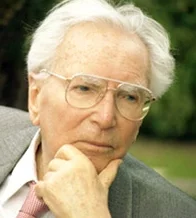"Man’s Search for Meaning" by Viktor E. Frankl
Suffering is something which most of us work day and night to avoid… but in the end, are we as successful as we would like to think? Is the work to prevent suffering not a kind of suffering in itself?
Well, according to Viktor E. Frankl, a psychiatrist who was held in four different concentration camps during the Second World War, including Auschwitz, there is no way for human beings to avoid suffering. However, it is within our power to choose to cope with it, find some kind of meaning in it, learn from it, and move onwards with more purpose than before.
Frankl is known for the development of logotherapy, a theory which basically states that unlike what Freud believes, man isn’t driven by pleasure, but by the pursuit and discovery of things we find meaningful.
In Man’s Search for Meaning Viktor chose to dedicate the first part of his book to his experiences in the concentration camps, where he lost his parents, his brother, and his pregnant wife. He spends more time not talking about life in the camp as it was, but his point of view towards what was happening, his mental state, and how he chose to face the suffering which was brought down upon him.
The other part of Viktor’s book is used to discuss logotherapy, although he chooses to only talk about it "in a nutshell", seeing as how he already wrote full and comprehensive texts about his theory, which you can check out for free I believe (you can find them using the search engine of your choice). I’m not going to discuss his theory much here because, honestly, I still haven’t got a good grasp of it yet.
However, rest assured that every single idea given life in this book is worth anyone’s attention… it’s one of those works that makes you think for days, weeks, months, years even after you have read. There is also a postscript added after 1984 to this book which talks about tragic optimism, which is the idea that a human being is naturally capable of remaining optimistic, even in the most dire circumstances.
The experiences suffered in the concentration camps by Viktor are used as a basis to make a case for tragic optimism, although, as is always when it comes to the human psyche and philosophy, there are no clear answers… just paths that lead into a darkness yet to be uncovered by us.
 |
Viktor Emil Frankl
|







Comments
Post a Comment